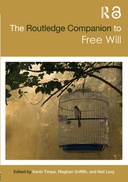Explore

The Routlege Companion to Free Will
Meghan Griffith, Neil Levy, Kevin Timpe
2016-2017
0 Ungluers have
Faved this Work
Login to Fave
In this chapter, I will outline the current debate over the extent to which agentsneed to be conscious of the facts to which they respond, as that debate has evolved inresponse to the findings of cognitive science. My aim is to assess the extent to which theempirical findings represent a serious threat to our capacity to act freely. In what follows,I understand ‘free will’ as a power of agents such that, by exercising that power inthe appropriate circumstances, they are morally responsible for their actions. Moralresponsibility, in turn, I understand as closely tied to desert of sanction or reward; to saythat an agent is morally responsible for an action is to say that in virtue of having performingit she might justifi ably be treated somewhat better or worse than otherwise (thisis of course defeasible and frequently defeated). I do not claim that this is the only defensibleunderstanding of either free will or of moral responsibility. Nevertheless, they areunderstandings that, as a matter of fact, are central to most debates about free will andmoral responsibility—as this volume illustrates—and which have clear and direct linksto important practical questions such as the justification of the criminal justice system
This book is included in DOAB.
Why read this book? Have your say.
You must be logged in to comment.
Rights Information
Are you the author or publisher of this work? If so, you can claim it as yours by registering as an Unglue.it rights holder.Downloads
This work has been downloaded 176 times via unglue.it ebook links.
- 176 - pdf (CC BY-NC-ND) at OAPEN Library.
Keywords
- Agents
- free will
- Humanities
- Philosophy
- thema EDItEUR::N History and Archaeology::NH History
- thema EDItEUR::Q Philosophy and Religion::QD Philosophy
Links
web: https://www.routledge.com/The-Routledge-Companion-to-Free-Will-1st-Edition/Timpe-Griffith-Levy/p/book/9781138795815Editions


